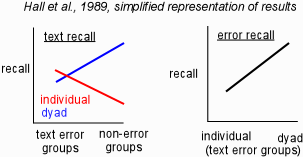Metacognition
Metacognition literally means "thinking about thinking". Educational and cognitive psychologists have come to recognize that this ability to "think about thinking" is an important characteristic of effective learning. Effective learners are aware of how much they are learning at any given time and compensate accordingly. We can think about this self-awareness as "meta" cognition, because such awareness is at a higher level than the learning of the content. For example, researchers have found that effective learners are better at rating their actual knowledge of a subject, by predicting their score on a test over the subject. They are also more likely to vary their reading speed and use different strategies in response to different levels of difficulty.
There are also specific strategies that learners can carry out that will increase their effectiveness, via metacognitive activities, such as periodic self-testing. One of the principal strengths of many types of cooperative learning is that learners are required to make their thoughts and knowledge explicit by sharing information with another learner. When a learner is required to share information in this way, it becomes obvious to all persons involved when he or she does and does not have a command of the information. You may recall from your reading that that the traditional scripted-cooperative learning strategy includes a "recall" step in which learners are required to report to their partner all they can remember from what they have read. This is followed by a "detect" step in which the other partner notes errors and omissions in the partner’s recall. These steps are perfect examples of activities that promote metacognitive awareness.
When I was a graduate student, I conducted a study in which students were required to study a passage in a dyad or individually using a four stage learning script that included the "recall" and "detect" stages (Hall, Dansereau, O’Donnell, & Skaggs, 1989). For half of these students we purposely imbedded errors that included misspellings, incorrect grammatical constructions, etc. in their study materials. Following the study period, all students completed a recall test of the materials and an "error detection" test in which they were asked to recall the nature, location, and frequency of errors they encountered while studying. This latter measure, the detection of errors, we considered as a measure of metacognitive awareness. Interestingly, for those who studied text without errors, those in the dyad group recalled significantly more than those who studied individually, a finding that is consistent with other research on scripted cooperative learning. However, for students who studied from the text with errors the recall scores did not significantly differ between dyad and individual study groups, and, in fact, those who studied in the dyads even performed a little worse. Further, for those who studied the text with errors, those who studied in dyads performed significantly better on the "error detection" test. (See the figure below). We interpreted these results as being due to the increased level of metacognitive awareness associated with scripted cooperative learning. Those in the dyads detected the errors more effectively, but this in turn increased their arousal and frustration, which, in turn negatively impacted their performance.

Hall, R.H., Dansereau, D.F., O’Donnell, A.M., & Skaggs, L.P. (1989). The effect of textual errors on dyadic and individual learning. Journal of Reading Behavior, 21, 127-140.